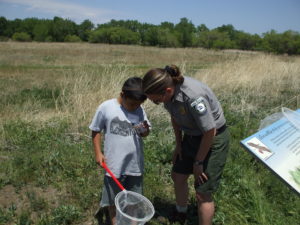Every summer for the past 20 years, in meadows and forests throughout Colorado, curious homeowners, land managers, educators and others do what they can to learn more about the native terrain.
 Shaun Howard is a lead park ranger for the 50,000+ acre Jefferson County Open Space system. In 1997, she was one of the first to sign up for a new Colorado State University Extension educational offering: the Native Plant Master Program. After taking three field courses and completing the required outreach of educational contacts, she became a certified Native Plant Master. Over the years, the knowledge she gained through the program multiplied far beyond her initial training.
Shaun Howard is a lead park ranger for the 50,000+ acre Jefferson County Open Space system. In 1997, she was one of the first to sign up for a new Colorado State University Extension educational offering: the Native Plant Master Program. After taking three field courses and completing the required outreach of educational contacts, she became a certified Native Plant Master. Over the years, the knowledge she gained through the program multiplied far beyond her initial training.
“As a park ranger and environmental educator, I have used information from the Native Plant Master courses to help literally thousands of people make personal connections to the plants of Colorado,” Howard says. “I’ve personally seen how these connections increase the value people place on the natural world so they become better stewards of our parks and open spaces.”
Howard is just one of the thousands of Native Plant Master students trained since the program began. The Native Plant Master Program was created to raise awareness about native plants, sustainable landscapes and threats to native ecosystems from invasive weeds. Originally started in Jefferson County, the program has expanded to 12 counties statewide.
“A philosopher once said, ‘a pebble was thrown in a pond’ which was true for us nearly 20 years ago,” says Barbara Fahey, Extension agent in Jefferson County. “It was the beginning of a ripple effect that has had far-reaching impacts.” Fahey is founder of the Native Plant Master educational program.
Native Plant Master Program impacts
The program has found a cost-effective way to increase the sustainability of Colorado’s managed and natural landscapes while reducing invasive weeds. Some of the impacts include:
- $1,704,557 statewide economic impact due to reduced landscaping inputs and increased land productivity
- 952,605 acres impacted by sustainable landscaping or alien invasive weed control completed by program participants
- 89,134 educational contacts made by volunteers
- 7,645 participants in the program
- 2,567 volunteers contributed 11,363 hours for a donated value of $267,712.
The economic impact stems from participants’ cost savings from implementing sustainable landscaping practices and invasive weed management on their owned or managed properties. Sustainable landscaping reduces such inputs as water use, pruning, and pest control. Weed control measures improve land productivity including crop output, grazing, landscapes, wildlife and tourism.
To earn certification as a Native Plant Master, volunteers must be accepted through an application process, complete three courses and make 60 educational contacts using information learned from the program. Courses are taught on trails in local open space parks and on other public lands. Participants who complete any three courses are awarded a Colorado Flora Certificate.
For more information on the Native Plant Master program, contact Barbara Fahey, CSU Extension agent at 303-271-6625 or visit the website.